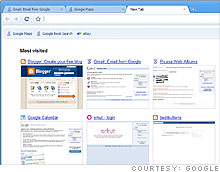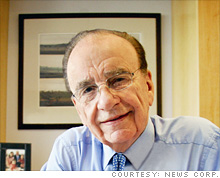For media, the year that wasn't
Some of the most-watched, most-hyped stories of 2008 did not exactly go as planned.
 |
| The search giant's 2008 innovations, such as the Chrome browser, didn't quite meet expectations. |
 |
| News Corp. shareholders didn't care much for Rupert Murdoch's Wall Street Journal acquisition. |
LOS ANGELES -- It's the back half of December and that can only mean one thing: the annual cavalcade of "top 10" lists for the year. But what is especially intriguing this year is to review what wasn't: all the much-hyped trends that did not go exactly as planned remind us that the colliding worlds of entertainment, media and technology remain wildly unpredictable and easily oversold. Here are just a few of the top non-developments of 2008:
Google's domination: Remember how Google was going to take over your TV, your mobile phone, the wireless Internet, renewable energy... everything? Well that may still happen someday. But 2008 was a year in which it became clearer that, for now, Google (GOOG, Fortune 500) rules the Web -- and paid search advertising in particular -- but has not had nearly as much success branching into other areas, particularly traditional media advertising like television, radio and print. Granted, the company is only a decade old and it's still the bogeyman/savior of 21st century media. But still, better luck next year.
Rupert Murdoch ruining the Wall Street Journal: In the year since Murdoch took over publisher Dow Jones, the story has shifted from whether the boundary-pushing media magnate will wreck the paper to whether the paper will wreck him -- or, more precisely, how much shareholders of Murdoch's News Corp. (NWS, Fortune 500) are punishing its stock because it expanded into newspapers at a time when that business seems to be falling off a cliff in the U.S. The paper is already changed under Murdoch, but the biggest fears of his ownership -- meddling to pursue his personal and corporate agendas -- have not yet materialized.
The banner financial year for media: On paper, 2008 had all the elements for a spectacular year in media and entertainment. The confluence of a U.S. presidential election, an Olympics and Hollywood putting its writers' strike behind it might have all contributed to solid gains for a lot of media and entertainment companies. The story, of course, has been rather different -- particularly if told through the headlines about layoffs or seen through the subjective prism of the stock market, which has punished most media-related stocks far more than even the broader market's declines (see Murdoch, above). A Sanford Bernstein reported noted that in the third quarter of the last U.S. election year, 2004, ad growth among traditional (that is, non-Internet) media was a strong 5.7 per cent over the previous year, thanks to the usual influx of political spending. Excluding Internet spending, ad spending across all traditional media in this year's third quarter was down 8.5 per cent, the sixth consecutive quarter of declining spending. And that was before the meltdown really got going.
The professional takeover of original Web video: If there ever seemed a sure-fire web video hit, it was "Hooking Up," an online series launched in the fall by HBOlab, an offshoot of the Time Waner (TWX, Fortune 500) cable programming juggernaut that brought you "The Sopranos" and "Entourage." The genius premise was that the show essentially aggregated several of the most-viewed stars of user-generated video from YouTube -- including the girl who starred as Lonelygirl15 -- and put them in an online reality show. (In a promotion, the show bragged that its stars' previous clips had been viewed more than 405 million times.) But chances are you haven't heard of, let alone seen, "Hooking Up," just as very few of the scores of online video creations launched by so-called professionals failed to capture the popular imagination this year. If this were a column about the year that was -- which it's not -- it might say that this was the year that watching re-runs of full-length episodes TV shows on sites like Hulu and ABC.com really gained traction. Ho hum.
Come to think of it, the biggest non-development in the year that wasn't was the fact that 2008 was the first year of this decade/century/millennium where it seemed like there was no defining media phenomenon to get excited about in a big way. No movie, no book, no new Web thingy or must-have gadget, no breakout TV shows.
Which isn't to say there were not plenty of interesting twists and turns with existing players, but no relative newcomers that bubbled through and captured the techno-cultural imagination the way that, say, Facebook or Slingbox or the iPhone or Wii did the past couple of years. (The only new, new thing that gained a modicum of notice is Twitter, sort of. Or perhaps the use of digital communication by the Obama campaign. ) Maybe there's been too big a dose of reality this year -- the real kind, not the TV kind -- which has momentarily dulled the impact of media. Or maybe it was just an off year.
So this was not a year to remember, and let's only hope that -- given all the dire economic news of late--next year is more promising. What do you think will be the big media trends and developments of 2009? Please send them to rsiklos@fortunemail.com ![]()
-
 The retail giant tops the Fortune 500 for the second year in a row. Who else made the list? More
The retail giant tops the Fortune 500 for the second year in a row. Who else made the list? More -
 This group of companies is all about social networking to connect with their customers. More
This group of companies is all about social networking to connect with their customers. More -
 The fight over the cholesterol medication is keeping a generic version from hitting the market. More
The fight over the cholesterol medication is keeping a generic version from hitting the market. More -
 Bin Laden may be dead, but the terrorist group he led doesn't need his money. More
Bin Laden may be dead, but the terrorist group he led doesn't need his money. More -
 U.S. real estate might be a mess, but in other parts of the world, home prices are jumping. More
U.S. real estate might be a mess, but in other parts of the world, home prices are jumping. More -
 Libya's output is a fraction of global production, but it's crucial to the nation's economy. More
Libya's output is a fraction of global production, but it's crucial to the nation's economy. More -
 Once rates start to rise, things could get ugly fast for our neighbors to the north. More
Once rates start to rise, things could get ugly fast for our neighbors to the north. More







